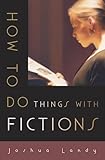How to do things with fictions / Joshua Landy.
Material type: TextPublication details: New York : Oxford University Press, c2012.Description: xiii, 250 p. : ill. ; 24 cmISBN:
TextPublication details: New York : Oxford University Press, c2012.Description: xiii, 250 p. : ill. ; 24 cmISBN: - 9780195188561
- 9780199378203
- 809.3
- PN 3335 L264h 2012
| Item type | Current library | Home library | Collection | Shelving location | Call number | Vol info | Copy number | Status | Date due | Barcode |
|---|---|---|---|---|---|---|---|---|---|---|
 Libro
Libro
|
Biblioteca Juan Bosch | Biblioteca Juan Bosch | Humanidades | Humanidades (4to. Piso) | PN 3335 L264h 2012 (Browse shelf(Opens below)) | 1 | 1 | Available | 00000114922 |
Browsing Biblioteca Juan Bosch shelves, Shelving location: Humanidades (4to. Piso), Collection: Humanidades Close shelf browser (Hides shelf browser)

|

|
No cover image available |

|

|

|

|
||
| PN 3331 M478t 2017 Theory of the novel / | PN 3331 V932i 2024 La invención de todas las cosas : una historia de la ficción / | PN 3335 B873u 1959 Understanding fiction / | PN 3335 L264h 2012 How to do things with fictions / | PN 3335 M449d 2006 Diez grandes novelas y sus autores / | PN 3335 P896a 2000 Análisis e interpretación de la novela : cinco modos de leer un texto narrativo / | PN 3335 R456r 1992 Le roman. |
Includes bibliographical references and index.
Introduction -- Chaucer : ambiguity and ethics -- Mark : metaphor and faith -- Mallarmé : irony and enchantment -- Plato : fallacy and logic -- Beckett : antithesis and tranquility.
"Why does Mark's Jesus speak in parables? Why does Plato's Socrates make bad arguments? Why are Beckett's novels so inscrutable? And why don't stage magicians even pretend to summon spirits anymore? In a series of captivating chapters on Mark, Plato, Beckett, Mallarmé, and Chaucer, Joshua Landy not only answers these questions but explains why they are worth asking in the first place. Witty and approachable, How to Do Things with Fictions challenges the widespread assumption that literary texts must be informative or morally improving in order to be of any real benefit. It reveals that authors are sometimes best thought of not as entertainers or as educators but as personal trainers of the brain, putting their willing readers through exercises designed to fortify specific mental capacities, from form-giving to equanimity, from reason to faith. Delivering plenty of surprises along the way--that moral readings of literature can be positively dangerous; that the parables were deliberately designed to be misunderstood; that Plato knowingly sets his main character up for a fall; that metaphor is powerfully connected to religious faith; that we can sustain our beliefs even when we suspect them to be illusions--How to Do Things with Fictions convincingly shows that our best allies in the struggle for more rigorous thinking, deeper faith, richer experience, and greater peace of mind may well be the imaginative writings sitting on our shelves."--Jacket.


There are no comments on this title.